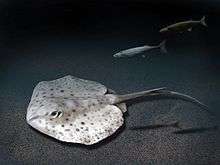Rhombodus
Rhombodus is a prehistoric genus of ray belonging to the family Rhombodontidae.
| Rhombodus | |
|---|---|
| Fossil tail spines of Rhombodus meridionalis from Khouribga (Morocco.) | |
| Scientific classification | |
| Kingdom: | |
| Phylum: | |
| Class: | |
| Order: | |
| Family: | Rhombodontidae |
| Genus: | Rhombodus Dames 1881[1] |
Species within this genus lived from the Cretaceous period, Maastrichtian age to the Paleocene epoch, from 70.6 to 55.8 million years ago.[1]

Life reconstruction of Rhombodus binkhorsti
Species
Species within this genus include:[1]
- Rhombodus andriesi Noubhani and Cappetta 1994
- Rhombodus binkhorsti Dames, 1881 North America
- Rhombodus bondoni Arambourg 1952
- Rhombodus carentonensis Vullo 2005
- Rhombodus ibericus Kriwet et al. 2007
- Rhombodus laevis Cappetta and Case 1975
- Rhombodus meridionalis Arambourg 1952
- Rhombodus microdon Arambourg 1952
Description
Rhombodus species could reach a length of 75–100 centimetres (30–39 in).[2] This genus is known from its caudal spines and rhombic teeth, which are all that usually fossilises. These rhombic teeth are bilobate, with vertical wrinkles and a width of about 1.5 centimetres (0.59 in).[3]
Distribution
Fossils have been found in the sediments of Africa, Europe, Asia and the Americas.[1]
gollark: Windows internals are wasting more.
gollark: It isn't THAT significant.
gollark: Using Linux means convenient management over SSH instead of "remote desktop protocol".
gollark: I'm not sure how specific it is to deep learning stuff though.
gollark: Have you heard of Triton? It's apparently a nice abstraction over CUDA.
References
See also
- Flora and fauna of the Maastrichtian stage
- List of prehistoric cartilaginous fish (Chondrichthyes)
This article is issued from Wikipedia. The text is licensed under Creative Commons - Attribution - Sharealike. Additional terms may apply for the media files.